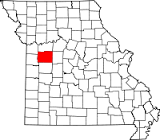A Directory of Towns, Villages,
and Hamlets
Past and Present
of Johnson County, Missouri
Compiled by Arthur
Paul Moser
Johnson County
[I]
Johnson County was organized by
act of the General Assembly, December 13,
1834, out of Lafayette County, which at
that time included all of what is now
Lafayette, Johnson and Henry Counties, the
northwest half of St. Clair, and a narrow
strip on the east side of Bates and Cass
Counties, about 1,600,000 acres. Johnson
County boundaries were as at present...
The first county court was held
at the residence of Mrs. Rachel Houx near
Columbus, on April 13, 1835...
At the second court on May 4,
1835, Richard Hancock was appointed
collector for the county, and the county
was divided into four townships, Jackson,
Washington, Jefferson and Madison.
In 1835 the county court
appointed four commissioners to select a
site for the future county seat. A site
had been selected but some people who had
moved into the county and settled near
Shanghai (Cornelia) bitterly opposed the
site because it was on one side of the
center of the county. The commissioners
reconsidered their decision and selected
Warrensburg as being as near the center of
the county as it was possible to get. The
county then bought the land of the owners
and laid out the town of Warrensburg, now
known as Old Town...
In the campaign to move the
county seat to Centerview, a newspaper was
published at Holden to especially promote
the move, and on August 14, 1872, the
records of the county court show the
following: George Washington, Elhanan
Roop, and others filed their petition
praying the court to submit to the voters
at the next general election, November 5,
1872, the proposition "for the removal of
the seat of justice of the county of
Johnson from the town of Warrensburg to
the town of Centerview." It was taken
under advisement till 1 P.M. Later in the
day "George Washington on behalf of the
petitioners withdrew the petition"... (--History
of Johnson County, 1918, Cockrell,
pp. 92, 93, 94.)
[II]
Settlements
Bluff Spring
Bluff Spring
settlement, including Basin Knob, was
among the first, and was a rival with
Columbus settlement. This settlement is
part now within the limits of Kingsville
and Jackson Townships, and is extensively
noticed elsewhere. (--History of
Johnson County., p. 214.)
Columbus
Columbus
settlement is the oldest of the county.
Pleasant Rice came here in 1827 and raised
the first corn crop of the county...Within
a few years the settlement was known all
over the State, and soon a large number of
emigrants sought here a home. Here the
first county courts were held, and, in
fact, the settlement was the hub around
which the interests of the old settlers
centered...Here were the first schools and
churches planted...(--History of
Johnson County, p. 213.)
Cornelia
Cornelia
settlement includes a portion of Post Oak,
Chilhowee and Centerview Townships. One of
the first jurymen of the county settled
within these bounds in 1834... (--History
of Johnson County, p. 214.)
Dunksburg (Grover
Township)
It is on the line
of Johnson and Pettis Counties, in Section
1, Township 47 N...In the year 1858 Dr. B.
F.Cunkley opened a store at this place,
which was commonly called Dunkley's store.
The common chat among the neighbors "Are
you going to the burg?" was answered by
the person who put the question, "What
burg?" "Dunklesburg." Finally, through the
joke the name was contracted to Dunksburg,
rather by accident. Soon after this the
village began to build up rapidly, so that
by 1860, it contained two stores,
blacksmith shop, tailor, shoemaker and a
school house.
The Post-office was not
established in the township until the
pioneers felt a deeper anxiety to hear
from their friends and relatives. Grover
Township never contained but one
post-office, and that on the Pettis
County line part of the time in the
adjoining county...
The first post-office
was named Bee Branch from the little
creek nearby and Benjamin Prigmore was
the first postmaster. The office was
moved to the village in 1858, and took
the name of the village Dunksburg, by
which it is generally known. During the
time of high political excitement, the
name was changed to Sigel in honor of
the "flying Dutchman". The latter name,
however, has never been accepted and
popularized... (--History of Johnson
County, pp. 619, 620.)
[III]
It is situated at
Section 1, Township 47 & Section 36,
Township 48 N, Range 24 W at the junction
of N & NN.
The post-office was
discontinued prior to 1905. (--General
Scheme, p. 55.)
Mail now via Sweet
Springs, Saline County; population 25.
(--Rand, McNally, 1974.) See A
Directory of Pettis County,
January 1980, Moser, for further
details.
Gallaher Mills Settlement
Gallaher Mills
settlement was made by Wm. Cheek, in the
year 1831, when he erected a water-mill
and sawed lumber on Clear Creek Fork near
the line of Grover and Washington
Townships. He sold to James A. Gallaher,
in 1834...Near Dunksburg, a settlement was
formed at an early date... (--History
of Johnson County, p. 213.)
Huff Settlement
Huff Settlement
includes a portion of Post Oak, Chilhowee
and Centerview Townships. Samuel Brown,
one of the first jurymen of the county,
settled within these bounds in the
1834'Section... (--History of Johnson
County, p. 214, 215.)
Hazel Hill Settlement
Hazel Hill
settlement was made about 1830. Judge
Harvey Harrison came here March 21, 1831,
and settled on the head of Walnut
Creek...Judge Harrison was born March 7,
1806, in Tennessee...He emigrated to
Alabama, near Huntsville, before the town
was laid out...About 1824 he came to
Missouri... (--History of Johnson
County, p. 214.)
Mulkey Settlement
Mulkey settlement
was in what is now known as Simpson
Township. James Mulkey settled on
Flagstaff, a small stream which took its
name from the abundance of flag growing
along the ponds and small lakes on either
side of the creek. Dr. Hamilton C. Davis
settled and had an extensive practice
about what is now (1881) called
Kirkpatrick's mills. A mill was owned by
Jerome Greer, who, with his brother, had a
little store on Blackwater. (--History
of Johnson County, pp. 213, 214.)
Rose Hill Settlement
Rose Hill
settlement was made contemporary with
surrounding settlements. Some times this
was known as the "Scott Neighborhood".
Richard Scott was one of the prominent
settlers...At an early day, a waterpower
grist-mill was erected by Welcome Scott on
Big Creek, and was noted far and near. (--History
of Johnson County, p. 214.)
[IV]
Kingsville Township
Bluff Spring was
made the first post-office in the
township. Benjamin Longacre was the first
postmaster. This was in 1827...The
post-office was discontinued in 1856, and
the office was moved to the village of
Kingsville, which was just laid out. Then
came Samuel Bolerjack, moving to the new
town and was continued in office until the
war of 1861...
It is said that when
the mail would arrive that the
postmaster would pour the contents of
the mail bag in the middle of the floor,
and if any were present, they could pick
their own mail. His wife couldn't read,
and when her husband was absent, and
anyone called for mail, she would say,
"Look over this package, an' see ef you
got anything." (--History of Johnson
County, pp. 514, 528.)
Owlsey and Wall Settlements
Owsley and Wall
settlements included all of Jefferson and
part of Post Oak Townships. John Owsley,
Mr. Draper, B. F. Wall....were among the
leading settlers... (--History of
Johnson County, p. 215.)
|


